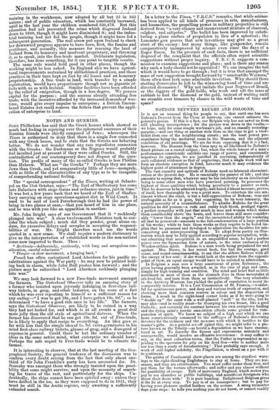NOTES AND QUERIES.
SOME Philhelene has said that the Greek houses which showed so much bad feeling in rejoicing over the ephemeral successes of their Russian friends were chiefly composed of Jews ; whereupon the Times is authorized to deny that there is a single Jew connected with any Greek house, and to state that the Greeks are behaving better. We do not wonder that any race repudiates connexion with the Greeks : the Bushmans or the Negroes would probably feel insulted just at present if they were called Greeks. Still, the contradiction of our contemporary does not dispose of the ques- tion. The profile of many of the so-called Greeks is less Phidian than Hebrew. What are " the Greeks " P Perhaps they are more Jews than Greek, and yet comparatively little of Jews—mongrels, with so little of the characteristics of any type as to be incapable of comprehending national feeling.
The " special correspondent" of the Times, writing at Sebasto- pol on the 21st October, says—" The Earl of Shaftesbury has come into Balaclava with siege-trains and ordnance-stores, just in time." It was but a few years back that we heard of the Earl of Shaftes- bury carrying on siege operations-against dirt in Wild Court. It used to be said of Lord Peterborough that he had the power of being in two places at once,—that you heard of him in one place, and he was with you like an apparition in another.
Mr. John Bright says of our Government that it " recklessly plunged into war." A clear twelvemonth Ministers took to con- sider the whole subject ; much did they ponder, great abuse en- dure, for excessive delays and scruples in accepting the responsi- bilities of war. Mr. Bright therefore must use the words quoted in a new sense. We shall require a modern dictionary to give us the interpretation of established words in the non-natural sense now imparted to them. Thus :
" Recklessly—deliberately, cautiously, with long and scrupulous con- sideration, careful reluctance." " Plunges—a slow movement, a hanging back."
Punch has often caricatured Lord Aberdeen for his pacific re- calcitrations against the War party : he may now be painted hold- ing back in alarm, while John Bull pushes him forward ; and the picture may be subscribed " Lord Aberdeen recklessly plunging into war."
We may look forward to a new Free-trade movement amongst the farmers. The Gateshead Observer tells an amusing story of a farmer who insisted upon joyously indulging in first-class rail- way tickets, in grog, and other luxuries, on the score of a fact which he was ever repeating to himself as a sufficient reason for any outlay—" I was to get 188., and I have getten 19s. 9d." ; so he determined "to have a good ride once in his life." The farmers, says the Gateshead Observer, are likely to be ruined in a way they had not looked for, and which is at all events a great deal more jolly than the old style of agricultural distress. When the farmer has discovered that he can get 19s. 9d. out of Free-trade, he is likely to apply that recipe to everything. An idea goes so far with him that the simple idea of ls. 9d. extra germinates in his mind first-class railway tickets, glasses of grog, and a disregard of expense in general. Could there be but the ordinary number of ideas in the same active mind, what enterprise we should have ! Perhaps the safe sequel to Free-trade would be to educate the farmer.
It is interesting to observe, that at the last meeting of the Geo- graphical Society, the general tendency of the discussion was to confirm every doubt arising from the fact that only about one- third of Sir John Franklin's party has been accounted for. Dr. Scoresby was amongst those who strongly insisted upon the possi- bility that some might survive, and -upon-the necessity of search- ing for traces of the rest; and particularly for the ships. Un- doubtedly, the ships cannot have been spirited away: unless they have drifted in the ice, as they were supposed to do in 1851, they must be still in the Arctic regions, only awaiting a sufficiently extended search. In a letter to the Times," F.R.C.S." remarks, that while science has been applied to all kinds of processes in arts, manufactures, and locomotion, the propelling power in military projectiles is still derived from " a very clumsy and inconvenient mixture of charcoal, sulphur, and saltpetre." The bullet has been improved by substi- tuting a plane surface of propulsion in lieu of a spherical ; the Lancaster gun proves that new inventions may give us a great start of the enemy : but many things, like gunpowder, remain comparatively unimproved by science even since the days of a Roger Bacon. In the presence of such facts, there is no sufficient disproof of the complaint that the officials often reject scientific suggestions without proper inquiry. F. R. C. S. suggests a com- mission to examine suggestions and plans; and is there any reason why such a body should not be appointed ? We can imagine the toil which it would have to go through ; but it is true that amongst the mass of raw suggestion brought forward by " unscientific Warners," there often does lurk some admirable invention. Why should those sterling discoveries be left to the winnowing band of time and un- directed discussion ? Why not imitate the poor Negroes of Brazil, or the diggers of the gold-fields, who wash and sift the mass of rubbish to find the diamond or the gold, instead of waiting until we stumble over treasure by chance in the wild waste of time and space ?


































 Previous page
Previous page